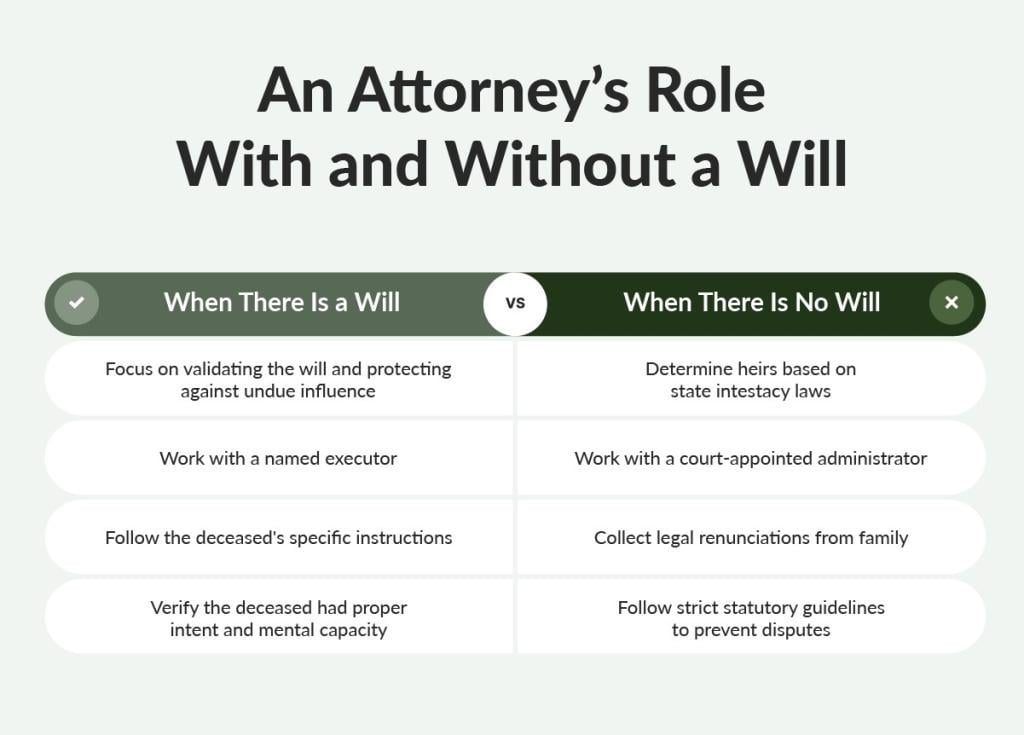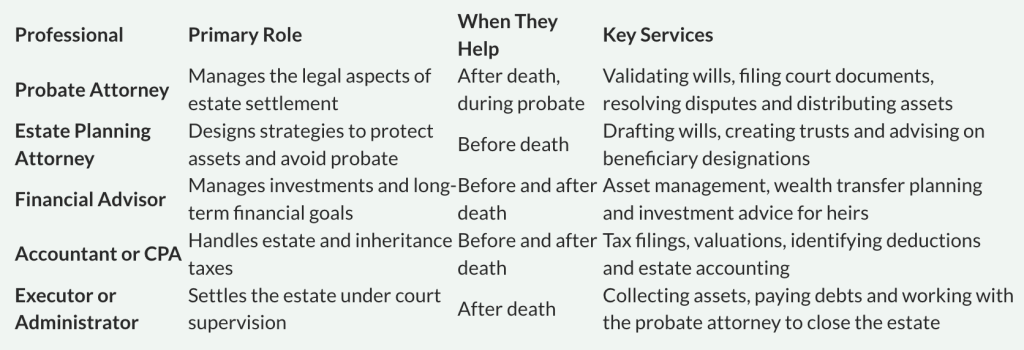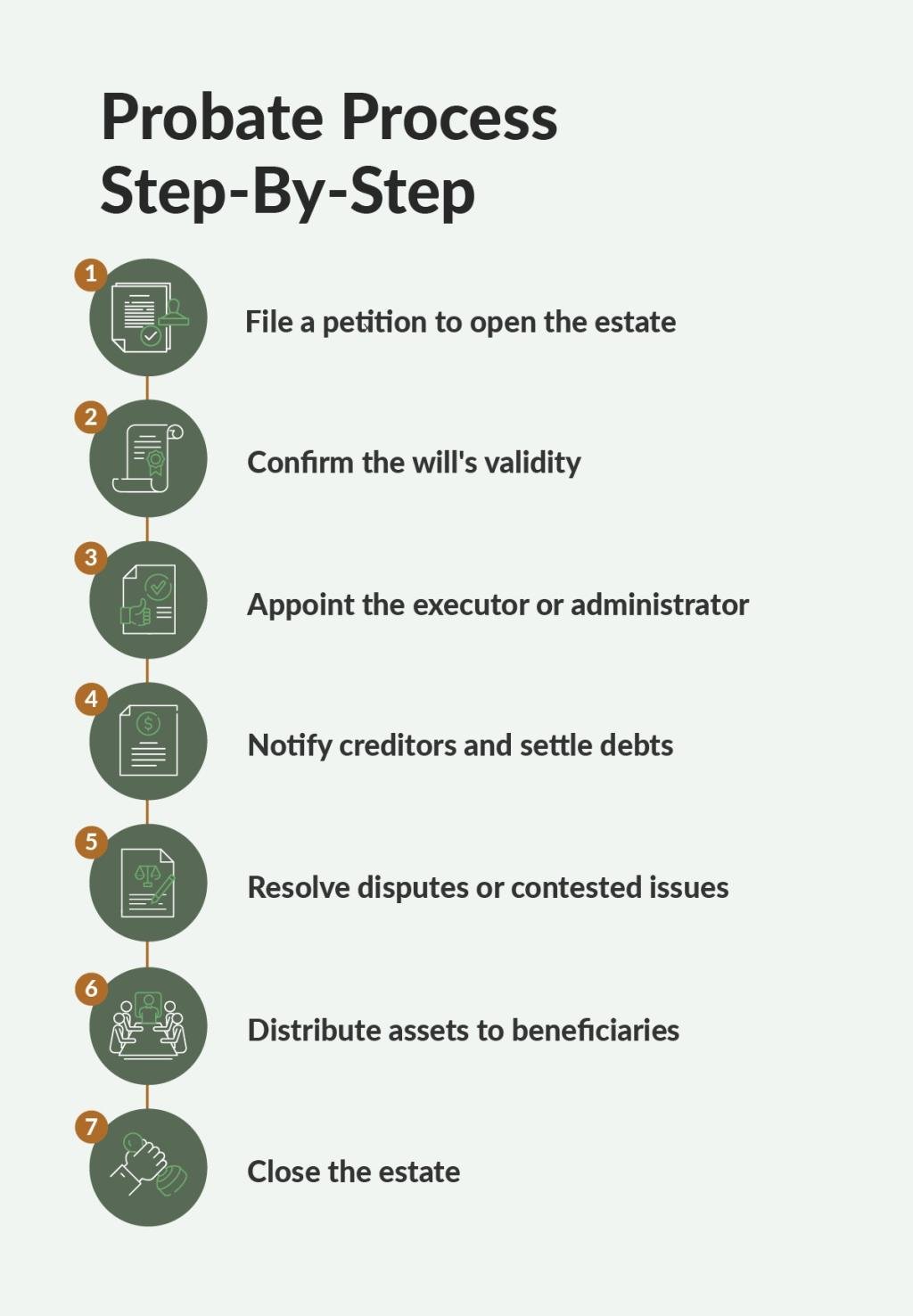
What is a probate attorney?
What is a probate attorney?
Probate can feel like stepping into a maze of legal paperwork, court deadlines and emotional decisions, often at one of life’s more difficult moments. Families suddenly find themselves juggling unfamiliar responsibilities while trying to honor a loved one’s wishes. In these moments, having professional guidance makes the difference between confusion and clarity, delay and progress, and uncertainty and peace of mind. This is what you can expect from a probate attorney.
Some probate lawyers are also qualified to assist the estate planning process, providing services like writing a will, creating a trust and establishing guardianship. Their rates depend on the size of the deceased’s estate, the value of their assets and sometimes the number of heirs involved with the estate. This guide from Inheritance Funding offers more insight into probate attorneys and their role in your inheritance.
Understanding Probate
After an individual passes, their assets — like real estate, bank accounts, investments and personal property — must be legally transferred to their heirs or beneficiaries. Probate is the legal process of distributing someone’s assets to the right people.
This process is supervised by the probate court, part of the judicial system responsible for distributing all property, debts and belongings of the recently deceased. Probate can be complicated and time-consuming, taking anywhere from several months to two years — especially if the will is unclear or if there are family disputes or multiple assets.
When Does Probate Start?
Probate starts when the executor named in a will, or an appointed administrator if there is no will, files a petition with the local probate court. The court verifies the will’s validity, identifies heirs and authorizes the executor to act on the estate’s behalf.
A probate attorney guides the executor through each step, ensuring all filings, notices and deadlines comply with state law. They help find and value assets, prepare inventories, pay legitimate debts and resolve creditor claims. If conflicts arise among heirs, the attorney mediates or represents the estate in court to protect their interests.
Going through probate alone is undoubtedly challenging, especially if you are unfamiliar with the process, which is why many beneficiaries turn to probate lawyers for help.
What Does a Probate Attorney Do?
Probate attorneys wear many hats — their day-to-day responsibilities vary considerably, depending on state-specific probate laws and the presence or absence of a will. An individual’s estate plan generally dictates the direction of the probate process.
All probate attorneys must have a state license and law degree to practice, while board-certified lawyers must receive a certification from the Estate Law Specialist Board. To earn these credentials, individuals must practice for a minimum of five years, take at least 12 hours of classes per year for three years and pass an exam.
With their training and studies, probate lawyers get extensive expertise on trust and inheritance laws and how to manage them. They’re highly knowledgeable about the most current requirements and even have specialized tax knowledge about inheritance and estates.
Probate lawyers help settle estates by:
- Filing probate petitions with the court to open or close an estate.
- Validating wills and ensuring they meet legal requirements.
- Guiding executors or administrators through their duties and responsibilities.
- Locating, identifying and valuing estate assets.
- Preparing and filing court-required documents like inventories, accountings and notices.
- Handling creditor claims to ensure valid debts and taxes are paid properly.
- Managing estate bank accounts and overseeing financial transactions.
- Distributing assets to beneficiaries according to state law and the will.
- Resolving disputes among heirs, beneficiaries and creditors through negotiation or litigation.
- Giving tax guidance, including filing estate or inheritance tax returns.
- Helping with intestate estates — when someone dies without a will.
- Helping avoid probate in the future by advising on beneficiary designations or trusts.
- Representing the estate in court hearings, especially if the will is contested.
- Ensuring compliance with state probate laws and deadlines to bypass delays and penalties.
- Supporting grieving families by managing complex paperwork and communication with the court.
Probate lawyers also handle life insurance policies, like collecting and managing the proceeds. They will also determine how much real property is involved in the estate, or the deceased’s land and all things attached to it, by organizing property appraisals. If an estate has any remaining debts or unpaid bills, a probate lawyer will figure out how to pay them.

An Attorney’s Role When There Is a Will
A probate attorney’s duties differ depending on whether the person who has passed away left a will. The best-case scenario is that the deceased individual drafted a valid will before they passed, which means they died testate.
When there’s a will, a probate lawyer will advise the estate executor and beneficiaries on relevant legal matters, like ensuring that the will is valid. To verify that a will is valid, an attorney will ensure the deceased had the intent to create it, was of sound mind and body when establishing it and was not coerced or under duress. Older adults with degenerative conditions like dementia are particularly vulnerable to influence by individuals who want a share of the estate.
An Attorney’s Role When There Is No Will
For estates without a will, called intestate estates, a probate attorney helps determine who inherits under state law. In such cases, the court appoints an administrator to perform duties similar to those of an executor. Because intestate estates follow strict statutory guidelines, legal oversight helps prevent expensive mistakes and family disputes. Probate attorneys also ensure estate and income taxes are calculated correctly and paid, lowering the risk of legal issues or penalties.
An individual who dies intestate passes without having written and signed a legal will. In these instances, the estate is distributed based on intestacy laws established in the state where the deceased’s property resides. Intestacy laws determine who will inherit the deceased’s assets — typically their relatives or a surviving spouse.
If a relative wants to act as the estate’s administrator, they must first get renunciations, or legal statements from the deceased’s other family members, declaring that they give up their rights to administer the estate. A probate attorney will often collect and file these documents with the probate court and help the administrator with the probate process.
Probate Attorneys vs. Other Estate Professionals
When you’re settling an estate, you often need more than one professional to complete the process. A probate attorney focuses on the legal aspects of estate administration, while other experts, such as financial advisors, estate planners and accountants, handle other aspects of asset management and protection.
A probate attorney ensures the estate complies with all legal requirements. They guide executors through court filings and help resolve disputes. In contrast, estate planners and financial professionals help clients organize their assets before death to simplify or even avoid the probate process. Meanwhile, accountants handle the tax implications, ensuring filings are accurate and deadlines are met.
Here’s how these professionals compare:

Together, these professionals ensure that both the legal and financial aspects of an estate are handled correctly, efficiently and in line with the deceased’s wishes.
Why Would You Need a Probate Attorney?
You typically need a probate attorney when an estate has significant assets, family disputes or legal complexity. While some small or straightforward estates don’t need full legal representation, many situations benefit from professional guidance. Even in simpler cases, hiring a probate attorney gives you peace of mind. They ensure compliance, prevent legal pitfalls and help close the estate efficiency.
State Laws
The complexity of the probate process often depends on the state where the deceased lived. For instance, states that follow the Uniform Probate Code (UPC) have more straightforward rules and procedures than those that don’t. The National Conference of Commissioners on Uniform State Laws (NCCUSL) created these regulations to streamline and standardize the probate process.
If your state has relatively simple probate laws, you may be able to navigate the process without a probate lawyer. But probate is complicated and time-consuming, even with the UPC.
Presence of a Will
Probate is much easier to manage with a will than it is without one. Without a will, the probate court becomes even more heavily involved in the process, further complicating matters. You’ll also need someone to determine who will inherit the deceased’s assets. In situations like these, a probate lawyer can help.
Even if the deceased left a will, it may be improperly witnessed or signed, unclear or nonspecific, warranting further investigation and decision-making from an experienced professional.
Estate Size
The more assets an estate has, the more complicated the probate process. Larger estates need many legal decisions, paperwork and discussions that can extend probate even further. If your loved one’s estate is on the larger side, consider hiring an attorney.
Beneficiary Relationships
During probate, the deceased’s family members must collaborate and make decisions about the estate. Heirs don’t always get along, creating disputes that may warrant probate lawsuits and will contests. These situations can prolong the probate process and can be costly.
If there are members of your family who don’t typically get along, you may need a probate lawyer to help with the process.
Types of Assets
The more complicated the assets, the longer you can expect probate to take. If the estate owns real estate, operates a business or includes investments that need to be sold or transferred, an attorney ensures each transaction follows the proper legal steps. They also help in contested estates, where the attorney represents your interests in court and helps reach fair resolutions.
If your loved one’s estate contains common assets like a house, bank accounts, household belongings and vehicles, you may not have to hire an attorney. Still, having legal assistance helps simplify the process and gives you more peace of mind. On the other hand, more complicated assets that require specialized handling, such as commercial real estate and businesses, need professionals to manage, appraise or sell these types of properties.
Federal Estate Taxes
Though most estates don’t owe federal estate taxes, larger ones sometimes do. If you find that your loved one’s estate owes taxes, you’ll need expert tax and legal advice from a probate attorney to help you file an estate tax return. Probate attorneys are helpful when creditors or tax authorities make claims against the estate. They evaluate debts and make sure taxes are filed correctly and on time. Without proper representation, executors can be held personally liable for errors.
Outstanding Debts
If the estate has enough money to pay all legitimate debts, such as the deceased’s funeral costs, medical expenses and final income tax, with enough left over to distribute to heirs, you may not need an attorney’s help to pay your loved one’s debts. If there isn’t enough money in the estate to pay the deceased individual’s debts, you should get legal advice before attempting to pay those bills.

Probate Process Step-By-Step
Understanding what to expect from a probate attorney during the probate process helps you navigate estate settlement. While each case is unique, most estates follow a series of predictable steps that protect beneficiaries and ensure the estate is managed correctly. These steps include:
- File a petition to open the estate: Filing the petition officially opens the estate and begins the legal oversight of the deceased’s property and obligations.
- Confirm the will’s validity: The court reviews the will to make sure it meets state legal standards. Witness statements or notarized affidavits may be required before the document is accepted as valid.
- Appoint the executor or administrator: The executor locates every asset and does appraisals on high-value items, with a full inventory submitted to the court for recordkeeping.
- Notify creditors and settle debts: Creditors are notified through public announcements and mailed notices. The executor reviews all claims, pays legitimate debts and disputes any that are invalid or unsupported.
- Resolve disputes or contested issues: If there are any disagreements over the will or asset value, the court addresses them through hearings or mediation. Legal representation often helps resolve conflicts.
- Distribute assets to beneficiaries: After debts and taxes are cleared, the executor distributes the remaining assets to heirs, according to the will or state inheritance laws. Each transaction is documented for accuracy.
- Close the estate: A final accounting is submitted to the court. Once approved, the court issues an order closing the estate and releasing the executor from further duties.
Frequently Asked Questions
If you choose to hire a probate attorney to help you with probate, there is important information you should have before selecting someone to represent you. It also helps when you have a thorough understanding of what a probate attorney offers, ensuring you find the right person for the job.
What Is Their Area of Practice?
Verify that your probate lawyer has expertise in probate law and estate planning. If the executor lives in another state, a probate attorney also acts as a representative, manages filings and attends hearings on the executor’s behalf.
How Long Can You Expect the Process to Take?
Although the probate process is tedious and time-consuming with or without a lawyer, ask prospective attorneys how long they expect the process to take. Some lawyers may be able to close the estate faster than others, depending on their experience. It’s also essential to consider the time involved if the lawyer charges by the hour.
How Much Do Probate Services Cost?
Perhaps the biggest question for every heir is how much they’ll have to pay for a probate lawyer. All attorneys charge different rates and fees for their services, which is why it’s important to ask about fees upfront. Will they charge an hourly rate, a flat fee or a contingency rate? Comparing the answers to these questions to your situation will give you a good idea of how much your attorney will cost.
Are There Alternatives to Probate?
Yes. Several legal and financial strategies can transfer property without going through probate:
- Revocable living trusts: When someone creates a trust, they transfer ownership of their assets into it during their lifetime. After death, the successor trustee distributes those assets directly to beneficiaries.
- Joint ownership with rights of survivorship: When two people jointly own property like a home or bank account, the surviving owner automatically inherits the deceased’s share. This transfer happens right away and doesn’t require court approval.
- Payable-on-death (POD): POD and transfer-on-death (TOD) designations let individuals name beneficiaries directly on financial accounts, securities or real estate titles. Upon death, the institution releases funds or transfers ownership to the named beneficiaries without involving probate court.
- Small estate affidavits: These simplified procedures let heirs collect certain assets like bank accounts or personal property by submitting a sworn statement instead of going through full probate.
Probate alternatives and legal guidance often work together. Each option, whether trust, joint ownership or TOD, comes with its own legal requirements and potential tax implications. A probate or estate attorney can help confirm that these tools are set up correctly and comply with state law. In many cases, thoughtful planning with the right legal support reduces the risk of disputes later and helps your family transfer assets smoothly, whether through probate or outside of it.
Inheritance Delays and Financial Solutions
Delays often occur when court backlog slows case review, when creditors file claims that need to be verified or when appraisals and tax filings take longer than expected. Family disagreements or unclear wills can also extend probate, as the court must resolve conflicts before any assets are released. Even administrative details, like locating financial accountants or property deeds, can stall the process.
For heirs relying on their inheritance to cover living expenses, pay medical bills or settle debts, these delays can cause financial hardship. That’s where inheritance funding or probate advances come in. These services let beneficiaries access a portion of their expected inheritance before the estate settles.
Choosing the Right Support During Probate
Managing an estate requires more than patience. It demands precision, legal awareness and emotional balance. The right support ensures every requirement is met, every asset is accounted for and every heir is treated fairly. Reliable professionals understand the complexity of probate and provide the structure you need to navigate it with confidence. With experienced guidance, your family will navigate the process efficiently and safeguard the legacy that matters most.
This story was produced by Inheritance Funding and reviewed and distributed by Stacker.



